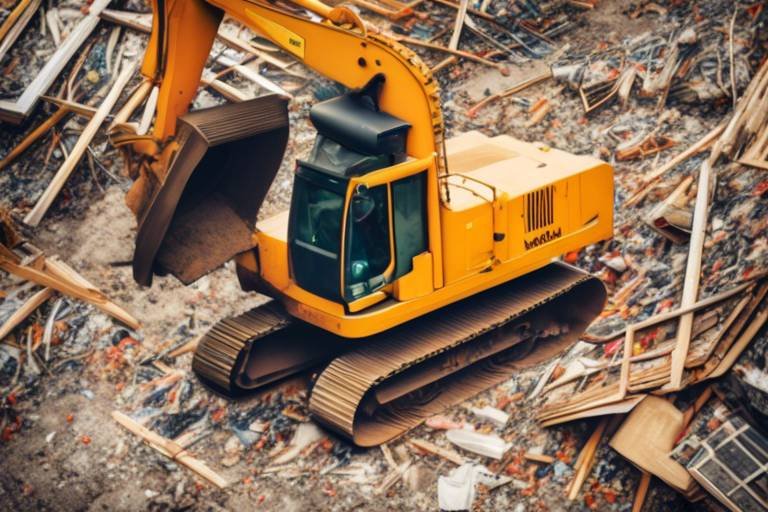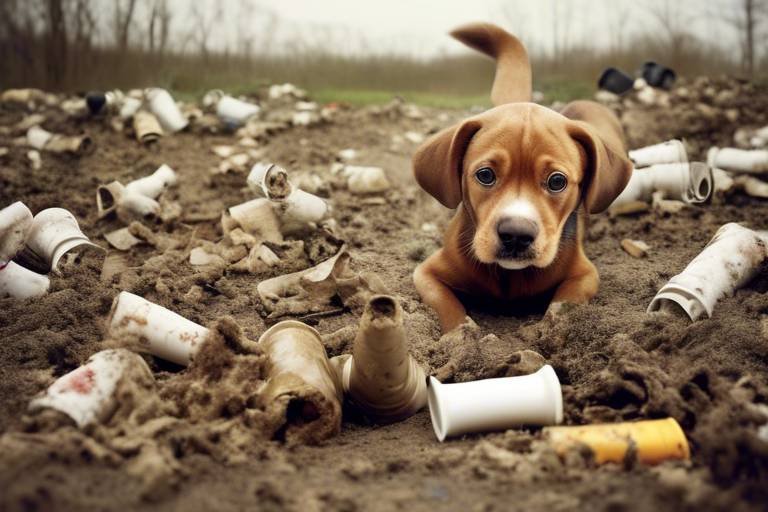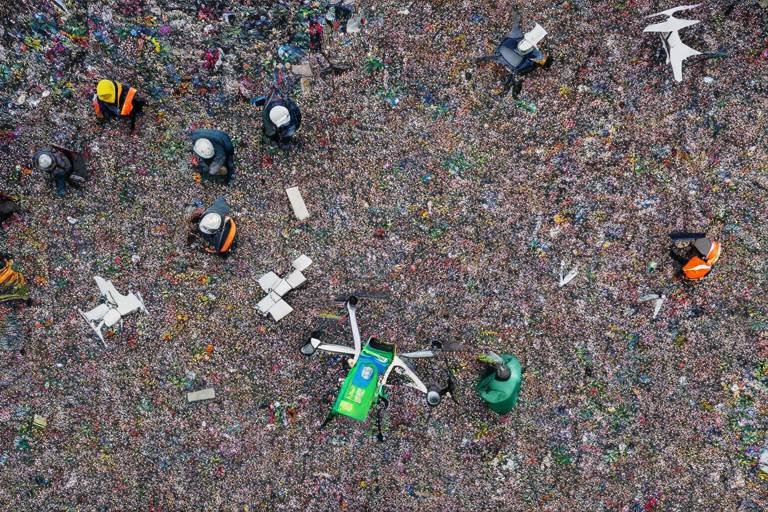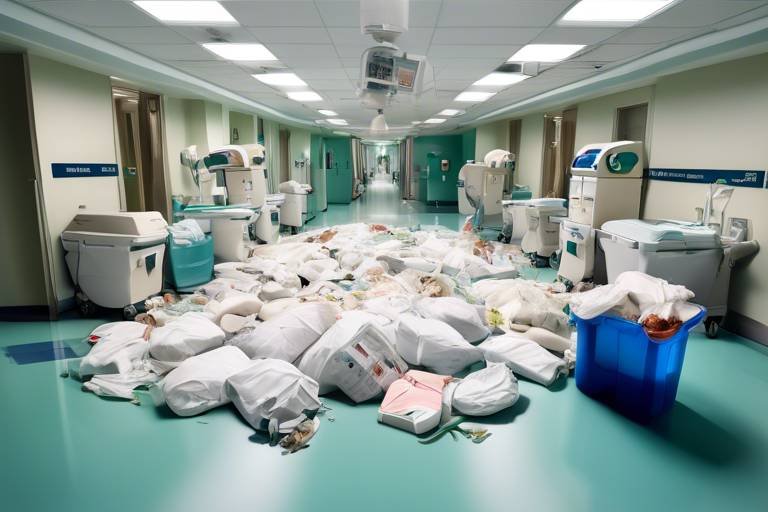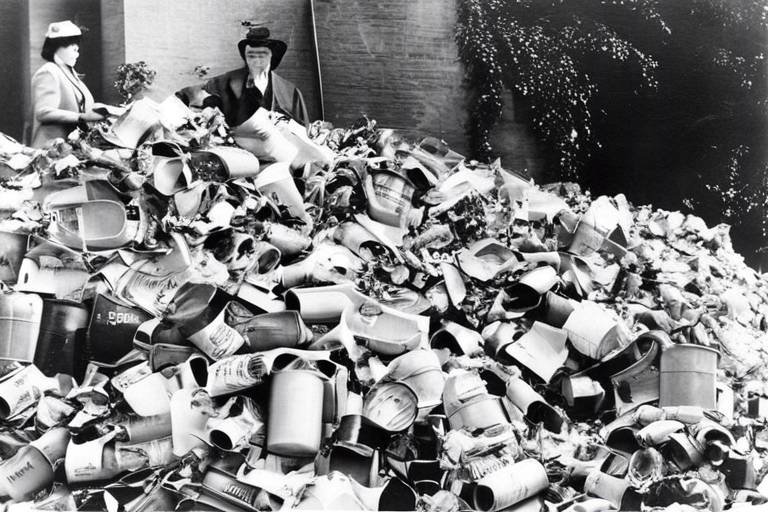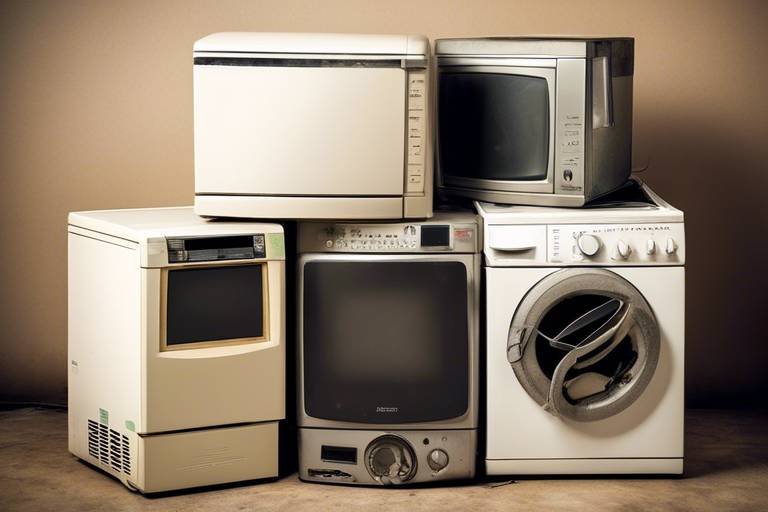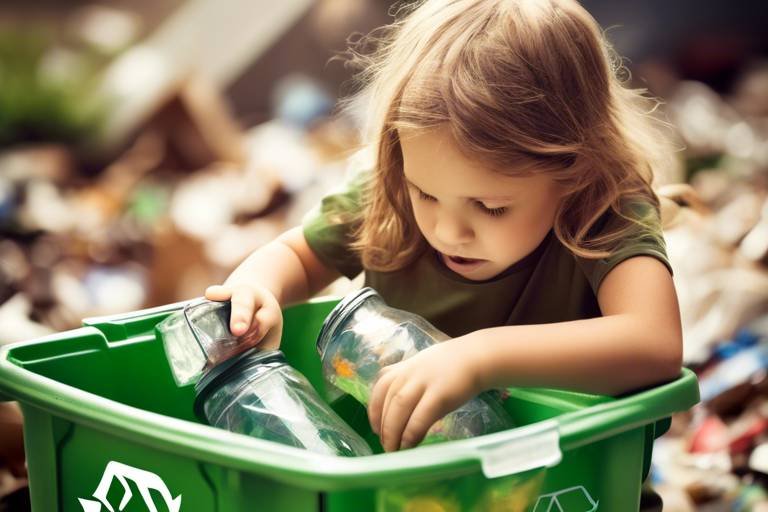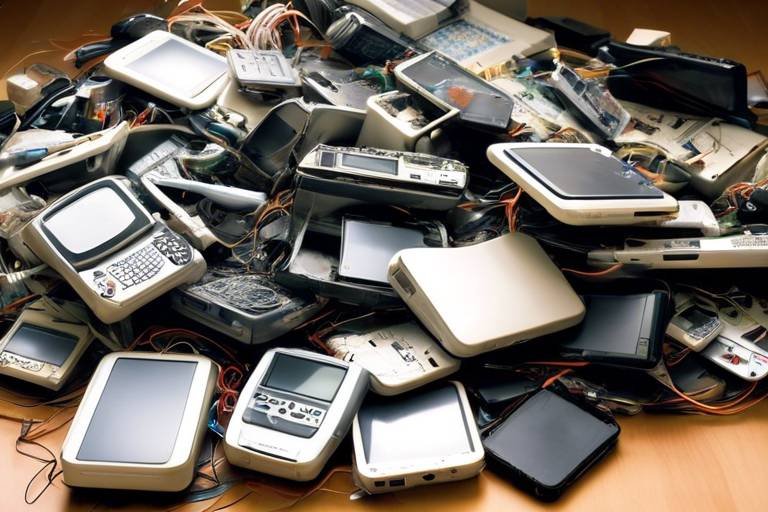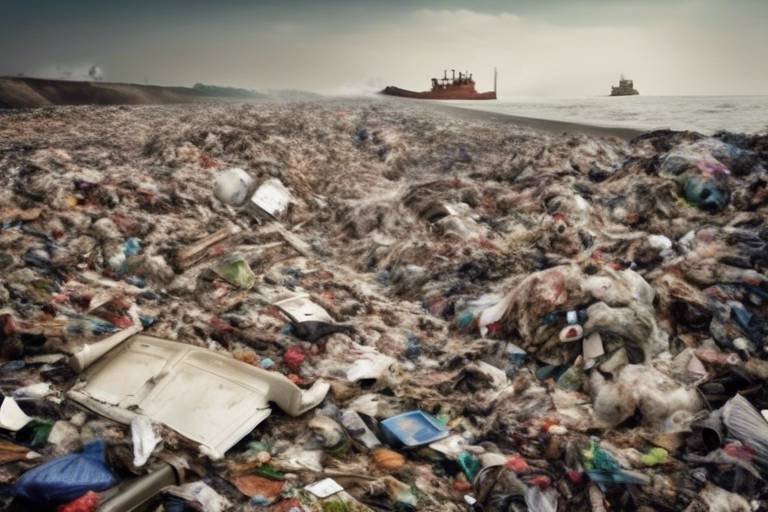What to Know About Green Waste And Composting
In today's world, where sustainability is more than just a buzzword, understanding green waste and its role in composting is crucial. Have you ever thought about what happens to your kitchen scraps or yard waste? Instead of ending up in a landfill, these materials can be transformed into something incredibly valuable: compost. This article delves into the significance of green waste, its composition, and how composting can lead to a more sustainable lifestyle. By the end, you’ll be equipped with practical tips to start composting at home, reducing landfill waste, and contributing to a healthier planet.
So, what exactly is green waste? It encompasses a variety of biodegradable materials, including grass clippings, leaves, and kitchen scraps. These organic materials are not just waste; they are resources waiting to be utilized! By understanding the composition of green waste, we can appreciate its benefits for effective composting and environmental sustainability. For instance, did you know that green waste can make up a significant portion of what we throw away? By composting these materials, we can significantly reduce our environmental footprint.
Composting is like giving a second life to organic waste. It transforms what would otherwise be garbage into nutrient-rich soil, perfect for gardens and plants. The benefits of composting extend beyond just improving your garden; they encompass environmental, economic, and gardening advantages. Let’s explore these benefits in detail.
One of the most significant impacts of composting is its ability to reduce greenhouse gas emissions. When organic waste ends up in landfills, it decomposes anaerobically, producing methane—a potent greenhouse gas. By composting, we divert this waste, significantly lowering our carbon footprint. Additionally, composting promotes biodiversity by enriching the soil, which in turn supports a variety of plant and animal life. Imagine a world where composting becomes the norm, leading to healthier ecosystems and a more balanced environment!
Compost is a powerhouse for improving soil health. It enhances soil structure, increases fertility, and boosts moisture retention. When you add compost to your garden, you're not just providing nutrients; you're creating a thriving ecosystem for your plants. Think of it as the ultimate food source for your garden, allowing plants to grow stronger and more resilient. Healthy soil leads to healthy plants, and healthy plants lead to a bountiful harvest.
By composting green waste, we can substantially decrease the volume of waste sent to landfills. This is not just about reducing waste; it's about rethinking how we view our organic materials. Instead of seeing them as trash, we can view them as valuable resources. Every time you compost, you're making a choice for a sustainable future, contributing to a cycle that benefits both you and the environment.
Composting is not just good for the planet; it can also be good for your wallet. By composting at home, you can save significantly on waste disposal costs. Moreover, the quality of your homegrown produce can improve, leading to better yields and healthier food. Imagine growing your vegetables with compost made from your kitchen scraps—it's like having a secret ingredient that enhances flavor and nutrition!
Starting a compost pile is easier than you might think, and it requires minimal resources. You don’t need to be a gardening expert to make a difference. With just a few simple steps, you can begin composting green waste at home. Let’s break it down into manageable pieces.
Selecting an appropriate compost bin is crucial for effective composting. There are various types of bins available, from traditional compost heaps to enclosed bins and even tumblers. Each type has its advantages depending on your space and needs. For instance, if you have a small yard, a compact bin might be ideal. On the other hand, if you have plenty of space, a larger heap could work wonders.
There are several methods to compost, including hot composting and vermicomposting. Hot composting involves creating a pile that generates heat, speeding up the decomposition process. Vermicomposting, on the other hand, uses worms to break down organic matter. Each technique has its benefits, and the choice depends on your lifestyle and preferences. Whether you want a quick turnaround or a more hands-off approach, there’s a composting method for you!
- What materials can I compost? Most kitchen scraps, yard waste, and even some paper products can be composted. Just avoid meat, dairy, and oily foods.
- How long does it take to make compost? Depending on the method used, compost can take anywhere from a few weeks to several months to fully decompose.
- Can I compost in an apartment? Absolutely! Consider using a worm bin or a small compost tumbler designed for limited space.

Understanding Green Waste
This article explores the significance of green waste, its role in composting, and practical tips for effective composting at home to promote sustainable practices and reduce landfill waste.
Green waste refers to biodegradable materials that are rich in nitrogen and include items such as grass clippings, leaves, and kitchen scraps. Understanding what constitutes green waste is crucial for effective composting and for fostering environmental sustainability. These organic materials are not just trash; they are valuable resources that can be transformed into nutrient-rich compost, benefiting both gardens and the planet.
When we think of green waste, we often picture a pile of leaves or a bag of grass clippings, but the reality is much broader. Green waste encompasses a variety of materials, including:
- Vegetable peels and fruit scraps
- Fresh grass clippings
- Plant trimmings and garden waste
- Coffee grounds and tea bags
- Eggshells
These materials are typically high in moisture and nitrogen, making them ideal for composting. They help to create a balanced compost pile when combined with brown waste, which includes carbon-rich materials like dried leaves, straw, and cardboard. This balance is essential for the composting process, as it ensures that microorganisms have the right nutrients to break down the organic matter effectively.
One of the most significant benefits of understanding and utilizing green waste is its potential to reduce landfill contributions. When green waste is disposed of in landfills, it decomposes anaerobically, generating methane—a potent greenhouse gas. By composting these materials instead, we can significantly decrease the amount of waste that ends up in landfills and contribute to a healthier planet.
Moreover, composting green waste not only helps in waste reduction but also promotes biodiversity. Healthy compost enriches the soil, fostering a thriving ecosystem that supports various plant and animal life. This symbiotic relationship between composting and biodiversity underscores the importance of managing green waste responsibly.
In summary, understanding green waste is the first step towards effective composting and environmental stewardship. By recognizing the value of these biodegradable materials, we can transform what would otherwise be waste into a resource that enriches our gardens and supports sustainable practices.
Composting transforms organic waste into nutrient-rich soil, benefiting gardens and reducing landfill contributions. This section highlights the environmental, economic, and gardening advantages of composting green waste.
Composting significantly reduces greenhouse gas emissions by diverting organic waste from landfills. This section discusses how composting contributes to a healthier planet and promotes biodiversity.
Compost enhances soil structure, fertility, and moisture retention. This subsection explains how composting green waste leads to healthier plants and sustainable gardening practices.
By composting green waste, we can substantially decrease the volume of waste sent to landfills. This part emphasizes the importance of waste reduction for a sustainable future.
Composting can lead to significant savings on waste disposal costs and enhance the quality of homegrown produce. This section delves into the economic benefits of composting for households.
Starting a compost pile is easy and requires minimal resources. This section provides step-by-step guidance for beginners looking to compost green waste at home.
Selecting an appropriate compost bin is crucial for effective composting. This subsection discusses different types of bins and their suitability for various spaces and needs.
There are various composting methods, including hot composting and vermicomposting. This part outlines different techniques to help readers choose the best approach for their situation.
Here are some common questions regarding green waste and composting:
- What can I compost? Most kitchen scraps, yard waste, and certain paper products can be composted.
- How long does it take to compost? Composting can take anywhere from a few weeks to several months, depending on conditions.
- Can I compost meat and dairy? It's generally not recommended as they can attract pests and create odors.
- Do I need to turn my compost? Turning your compost helps aerate it, speeding up the decomposition process.

The Benefits of Composting
Composting is more than just a way to manage your kitchen scraps and yard waste; it’s a powerful tool for enhancing our environment and promoting sustainability. When we think about the benefits of composting, it’s easy to get excited! It’s like turning trash into treasure, and the rewards are plentiful. Let’s dive into the various advantages that composting brings to the table, shall we?
First and foremost, composting plays a significant role in environmental sustainability. By recycling organic materials, we can significantly reduce the amount of waste that ends up in landfills. Did you know that organic waste makes up about 30% of what we throw away? By composting, we not only cut down on landfill contributions but also minimize greenhouse gas emissions. When organic waste decomposes in landfills, it produces methane, a potent greenhouse gas. Composting, on the other hand, allows for aerobic decomposition, which produces far less methane. Isn’t that a win-win?
Another fantastic benefit of composting is the improvement of soil health. Compost is like a superfood for your garden! It enriches the soil, enhances its structure, and improves its ability to retain moisture. Healthy soil leads to healthier plants, which in turn leads to bountiful harvests. Imagine the satisfaction of growing your own vegetables, knowing that you’ve nurtured them with nutrient-rich compost made from your own waste. It’s like giving your plants a delicious meal!
Moreover, composting can also lead to a significant reduction in your household waste. Each time you toss your kitchen scraps into the compost bin instead of the trash, you’re actively participating in a sustainable practice. To illustrate this, consider the following table that shows the potential reduction in waste:
| Type of Waste | Weight (lbs) per Year | Potential Composting Reduction (lbs) |
|---|---|---|
| Kitchen Scraps | 200 | 200 |
| Yard Waste | 150 | 150 |
| Total Potential Reduction | 350 | 350 |
Now, let’s talk about the economic advantages of composting. By composting at home, you can significantly cut down on waste disposal costs. Many municipalities charge for trash collection based on the volume of waste you produce. By reducing the amount of waste you send to the landfill, you can potentially lower your trash bill. Plus, composting leads to better quality produce in your garden, which means less money spent on store-bought vegetables. It’s like saving money while being eco-friendly!
In summary, the benefits of composting are multi-faceted. From reducing landfill waste and greenhouse gas emissions to improving soil health and saving money, composting is a practice that everyone can embrace. It’s a simple yet effective way to contribute to a healthier planet while reaping the rewards in your own backyard. So, why not start composting today? Your garden—and the Earth—will thank you!
- What can I compost? You can compost kitchen scraps like fruit and vegetable peels, coffee grounds, eggshells, and yard waste such as grass clippings and leaves.
- How long does it take to compost? Composting can take anywhere from a few weeks to several months, depending on the materials used and the composting method.
- Can I compost meat and dairy? It's generally not recommended to compost meat and dairy as they can attract pests and create odors.

Environmental Impact
Composting is not just a trend; it's a crucial practice for our environment. When we toss organic waste into landfills, it decomposes anaerobically, releasing harmful greenhouse gases like methane, which is over 25 times more potent than carbon dioxide in trapping heat in the atmosphere. By composting green waste, we can significantly reduce these emissions, helping to combat climate change. It’s like turning your kitchen scraps into a superhero that fights against global warming!
Moreover, composting enriches the soil, which in turn enhances biodiversity. Healthy soil supports a diverse range of organisms, from earthworms to beneficial bacteria, all of which play a vital role in maintaining ecosystem balance. Think of compost as a multi-vitamin for the earth, boosting its health and resilience.
Not only does composting improve soil health, but it also helps in water retention. When compost is added to soil, it acts like a sponge, holding moisture and reducing the need for frequent watering. This is especially important in drought-prone areas where every drop counts. The environmental benefits of composting extend beyond just waste reduction; they encompass a holistic approach to nurturing our planet.
In terms of practical application, composting can lead to a significant reduction in the volume of waste sent to landfills. For instance, a typical household can divert up to 30% of its waste through composting. That’s a massive amount when you consider the millions of households across the globe. To illustrate this impact further, take a look at the following table:
| Waste Type | Typical Landfill Contribution (%) | Potential Reduction through Composting (%) |
|---|---|---|
| Food Scraps | 15-20% | 50% |
| Yard Waste | 10-15% | 100% |
| Paper Products | 20-30% | 30% |
As you can see, composting not only helps reduce the amount of waste we generate but also plays a significant role in lowering our carbon footprint. So, the next time you think about tossing those vegetable peels in the trash, remember that you have the power to make a difference. By composting, you're not just managing waste; you're actively participating in a movement towards a cleaner, healthier planet.
- What can I compost? You can compost fruit and vegetable scraps, coffee grounds, eggshells, grass clippings, leaves, and even small branches.
- What should I avoid composting? Avoid composting meat, dairy products, oils, and any non-biodegradable materials.
- How long does it take for compost to be ready? Depending on the method used, it can take anywhere from a few weeks to several months for compost to mature.
- Can I compost in an apartment? Absolutely! There are various composting solutions like worm bins and Bokashi systems that are perfect for small spaces.

Soil Health Improvement
When it comes to gardening, the health of your soil is akin to the foundation of a house; without a solid base, everything above it is at risk. Composting green waste plays a pivotal role in enhancing soil health, creating a rich, fertile environment that supports robust plant growth. By integrating compost into your garden, you’re not just adding nutrients; you’re also fostering a vibrant ecosystem beneath the surface.
Compost is a powerhouse of organic matter, teeming with beneficial microorganisms that work tirelessly to break down nutrients and improve soil structure. This process leads to a variety of significant improvements:
- Enhanced Soil Structure: Compost helps to create a crumbly texture in the soil, allowing for better aeration and drainage. This is essential for root development, as plants need both air and water to thrive.
- Increased Nutrient Content: As compost decomposes, it releases a balanced mix of nutrients like nitrogen, phosphorus, and potassium, which are vital for plant growth. This means healthier plants that can resist diseases and pests more effectively.
- Improved Moisture Retention: Compost has the ability to hold moisture, reducing the need for frequent watering. This is particularly beneficial in dry seasons, as it helps plants access water more efficiently.
Moreover, the addition of compost leads to a more diverse soil microbiome. Just as a diverse diet is essential for human health, a variety of microorganisms in the soil promotes resilience against pests and diseases. This natural balance is crucial for sustainable gardening practices, reducing the need for chemical fertilizers and pesticides that can harm the environment.
In summary, composting green waste not only enriches the soil but also sets the stage for a thriving garden ecosystem. By nurturing the soil, you’re not just growing plants; you’re cultivating a healthier environment for future generations. So, the next time you toss those kitchen scraps or yard waste into your compost bin, remember that you’re making a significant investment in the health of your garden and the planet.
1. What types of green waste can I compost?
You can compost a variety of green waste, including grass clippings, vegetable scraps, fruit peels, coffee grounds, and garden trimmings. Just avoid meat, dairy, and oily foods, as these can attract pests.
2. How long does it take for compost to be ready?
The time it takes for compost to be ready can vary, but generally, it takes between 3 to 6 months. Factors like temperature, moisture, and the materials used can influence this timeline.
3. Can I compost in an apartment?
Absolutely! There are several compact composting options available, such as worm bins or bokashi composting, which can easily fit into small spaces.
4. Is composting difficult?
Not at all! Composting is quite simple. Just collect your green waste, choose a composting method that suits your living situation, and maintain a balance of green and brown materials.

Reduction of Landfill Waste
When we think about waste, it’s easy to picture heaps of garbage piling up in landfills, but what if I told you that a significant portion of that waste is actually compostable? Green waste, which includes items like grass clippings, leaves, and vegetable scraps, can take up a lot of space in landfills. In fact, according to the Environmental Protection Agency, food and yard waste together account for approximately 30% of what we throw away. By composting these materials, we can dramatically reduce the amount of waste that ends up in landfills, which is a win-win for both our environment and our communities.
Every time we choose to compost instead of tossing our green waste into the trash, we are taking an active step towards a more sustainable future. Imagine the impact if every household made this simple switch! Not only does composting reduce landfill waste, but it also lessens the burden on waste management systems. Landfills are not just unsightly; they are also a source of greenhouse gas emissions, including methane, which is a potent contributor to climate change. By diverting organic waste from landfills, composting plays a crucial role in reducing these harmful emissions.
Furthermore, composting can lead to significant cost savings for municipalities. When less waste goes to the landfill, cities can save on disposal costs, which can then be redirected to other community services. This economic benefit is often overlooked but is incredibly important. Think of it this way: every bag of compostable material you keep out of the trash is a small victory for your wallet and the planet!
To illustrate the impact of composting on landfill waste, consider the following table:
| Waste Type | Percentage of Total Waste | Potential Reduction through Composting |
|---|---|---|
| Food Waste | 15% | Can be composted to reduce landfill contributions |
| Yard Waste | 13% | Can be composted to enhance soil health |
| Other Organic Waste | 2% | Can be composted for further waste reduction |
As you can see, a substantial amount of what we throw away is compostable. By taking action to compost at home, we are not just reducing landfill waste; we are also contributing to a circular economy where organic materials are returned to the earth instead of being buried. It’s a sustainable practice that benefits us all, promoting healthier soil, gardens, and ultimately, a healthier planet.
So, the next time you’re about to toss those vegetable peels or grass clippings into the trash, think about the impact of your choice. Composting is a simple yet powerful way to reduce landfill waste and contribute to a cleaner, greener world. Let’s make composting a habit and inspire others to do the same!
- What can I compost? You can compost kitchen scraps like fruit and vegetable peels, coffee grounds, eggshells, and yard waste like grass clippings and leaves.
- How long does it take to make compost? Depending on the method you choose, composting can take anywhere from a few weeks to several months.
- Can I compost meat and dairy? It’s best to avoid composting meat and dairy as they can attract pests and create odors.
- Do I need a compost bin? While a compost bin can help contain the materials, you can also compost in a pile or use a simple container.

Economic Advantages
Composting isn't just an eco-friendly practice; it also brings significant economic advantages to households. When you start composting, you're not just reducing waste; you're also saving money in a variety of ways that can really add up over time. For instance, by transforming your kitchen scraps and yard waste into rich compost, you can cut down on the need for store-bought fertilizers and soil amendments. Instead of spending your hard-earned cash on products that are often laden with chemicals, you can create your own nutrient-rich compost right in your backyard.
Moreover, composting can lead to a reduction in waste disposal costs. Many municipalities charge fees based on the volume of waste collected, and by composting your green waste, you're effectively decreasing the amount of trash that goes to the landfill. This not only saves you money but also contributes to a more sustainable waste management system. Just imagine how much you could save on those pesky garbage bills!
In addition to reducing waste disposal costs, composting can enhance the quality of your homegrown produce. Healthier soil leads to healthier plants, which can yield a bountiful harvest. This means that the fruits and vegetables you grow at home can be not only fresher but also cheaper than what you find at the grocery store. When you factor in the rising costs of organic produce, the savings can be substantial. Here’s a quick breakdown of potential savings:
| Expense Type | Potential Savings |
|---|---|
| Store-bought Fertilizers | $20 - $50 per season |
| Waste Disposal Fees | $10 - $30 per month |
| Fresh Produce Costs | $50 - $100 per season |
As you can see from the table above, the financial benefits of composting can be quite impressive. By investing a little time and effort into composting, you not only contribute to a healthier planet but also enjoy substantial savings. It’s like hitting two birds with one stone: you’re nurturing your garden while also nurturing your wallet!
So, if you haven't yet considered composting as a viable option, now is the time to start. The economic advantages are just as compelling as the environmental ones. With a little commitment, you can turn your kitchen scraps into a treasure trove of savings and sustainability. Why not give it a try? Your garden—and your wallet—will thank you!
- What can I compost? Most organic materials like fruit and vegetable scraps, coffee grounds, eggshells, grass clippings, and leaves are great for composting.
- How long does it take to make compost? Depending on the method you use, it can take anywhere from a few weeks to several months to produce finished compost.
- Can I compost meat and dairy products? It's generally not recommended to compost meat and dairy, as they can attract pests and create odors.
- Do I need special equipment to compost? No, you can start composting with just a simple bin or even a pile in your backyard.

How to Start Composting
Starting your own composting journey is not only a rewarding experience but also a significant step towards sustainability. It may seem daunting at first, but with just a few simple steps, you can transform your kitchen scraps and garden waste into a valuable resource for your plants. The first thing you need to consider is the location of your compost pile or bin. Ideally, it should be in a spot that is easily accessible, has good drainage, and receives some sunlight. This will help speed up the composting process by keeping the materials warm and dry.
Once you've chosen the perfect spot, it's time to think about what type of compost bin will work best for you. There are several options available, from store-bought bins to DIY solutions. For instance, a simple wooden pallet structure can be effective for larger yards, while a compact tumbler might be ideal for smaller spaces. The key is to find a bin that suits your needs and fits comfortably within your available space.
Now comes the fun part: gathering your materials! Composting works best when you have a good mix of "greens" and "browns." Greens include nitrogen-rich materials like grass clippings, vegetable scraps, and coffee grounds, while browns are carbon-rich materials such as dried leaves, straw, and cardboard. Aim for a ratio of about 1 part greens to 3 parts browns to create an optimal environment for decomposition. Remember, variety is essential; the more diverse your compost ingredients, the better the end product.
As you start adding materials to your compost bin, be sure to chop or shred larger items to speed up the decomposition process. It's also crucial to turn your compost regularly—about once a week is ideal. This aerates the pile, allowing oxygen to circulate and helping to break down the materials more efficiently. Not only does this keep your compost healthy, but it also reduces odors.
Lastly, patience is key. Composting is a natural process that takes time—usually anywhere from a few weeks to several months, depending on the materials used and the method of composting. You'll know your compost is ready when it looks dark and crumbly, with an earthy smell. At this point, you can use it to enrich your garden soil, potting mix, or even as a top dressing for your plants.
To summarize, here are the essential steps to start composting:
- Choose the right location for your compost bin.
- Select a suitable compost bin or create your own.
- Gather a mix of greens and browns.
- Turn your compost regularly for aeration.
- Be patient and wait for your compost to mature.
By following these steps, you’ll be well on your way to creating nutrient-rich compost that can help your garden thrive while reducing waste in landfills. Happy composting!
1. What can I compost?
You can compost a variety of organic materials, including fruit and vegetable scraps, grass clippings, leaves, coffee grounds, and eggshells. Avoid meat, dairy, and oily foods as they can attract pests.
2. How often should I turn my compost?
Turning your compost every week or two is ideal. This helps aerate the pile and speeds up the decomposition process.
3. How long does it take for compost to be ready?
The time it takes for compost to mature can vary widely, from a few weeks to several months, depending on the materials used and the composting method.
4. Can I compost in the winter?
Yes, you can compost in winter! While the process may slow down, it will still occur. Just make sure to insulate your compost bin to retain heat.
5. What should I do if my compost smells bad?
A foul smell usually indicates that your compost pile is too wet or has too many greens. Try adding more browns, turning the pile, and ensuring good aeration.

Choosing the Right Bin
When it comes to composting, selecting the right bin is like choosing the perfect pot for a plant; it can make all the difference in your composting journey. The type of bin you choose will depend on various factors, including your available space, the volume of green waste you generate, and your personal preferences. First off, consider the size of your yard or balcony. If you have a spacious garden, a large compost bin or even a compost pile might work best for you. However, if you're living in an apartment with limited outdoor space, a compact bin or a worm composting system could be your best bet.
There are several options available, each with its own benefits:
- Open Compost Bins: These are typically made of wood or wire and allow for easy access and aeration. They're great for larger quantities of waste but may attract pests if not managed properly.
- Closed Compost Bins: These bins are enclosed and can help keep pests out while also retaining heat and moisture, which speeds up the composting process. They are ideal for smaller spaces.
- Tumbler Bins: These rotating bins make it easy to turn your compost, promoting faster decomposition. They are convenient but can be more expensive than traditional bins.
- Worm Bins (Vermicomposting): If you're short on space, a worm bin is an excellent choice. It uses red wigglers to break down food scraps into nutrient-rich compost, and it can be kept indoors.
Before making your purchase, think about your composting goals. Are you looking to create rich soil for your garden, or are you merely trying to reduce kitchen waste? Understanding your objectives will guide you in selecting the most suitable bin. Additionally, consider the materials used in the bin. Look for durable, weather-resistant options that can withstand the elements if you plan to keep your bin outdoors.
Don’t forget about accessibility! A bin that’s easy to open and close will encourage you to keep adding to it regularly. Remember, the more you compost, the healthier your plants will be, and the more you contribute to a sustainable environment. So, choose wisely, and you’ll be well on your way to a successful composting experience!

Composting Techniques
Composting is not a one-size-fits-all process; there are various techniques that cater to different needs, spaces, and lifestyles. Understanding these methods can make the composting journey more enjoyable and effective. Whether you have a sprawling backyard or a small apartment balcony, there’s a composting technique just for you!
One popular method is hot composting. This technique involves creating a compost pile that generates heat through the natural decomposition process. By maintaining a balance of carbon-rich (brown) and nitrogen-rich (green) materials, you can achieve temperatures between 130°F to 160°F. This heat not only speeds up decomposition but also kills off pathogens and weed seeds, resulting in a cleaner, healthier compost. Hot composting is particularly effective for those who want quick results, as a well-managed pile can yield finished compost in as little as four to six weeks.
On the other hand, if you’re looking for a more hands-off approach, cold composting might be your best bet. This method allows organic materials to decompose naturally over time without the need for frequent turning or monitoring. While it takes longer—often several months to a year—the process is simpler and requires less attention. Just pile up your green waste, and let nature do its work! However, be mindful that cold composting may not reach the high temperatures needed to eliminate pathogens, so it's best for materials that are already disease-free.
For those with limited space, vermicomposting is an excellent alternative. This technique utilizes worms, typically red wigglers, to break down organic waste. By setting up a worm bin, you can compost kitchen scraps indoors, making it perfect for apartment dwellers. Worms not only speed up the composting process but also produce nutrient-rich worm castings, which are fantastic for your plants. Just remember to keep the bin moist and avoid adding citrus or onion scraps, as these can be harmful to the worms.
Another technique gaining popularity is bokashi composting. This unique method involves fermenting kitchen waste using a special mix of microorganisms. Bokashi composting can handle a wide variety of materials, including meat and dairy, which are typically not suitable for traditional composting. The process is quick and can be done indoors, making it a great choice for urban composters. Once the fermentation process is complete, the mixture can be buried in soil to further decompose, enriching the earth.
To help you choose the right method for your composting journey, here’s a simple comparison table:
| Composting Technique | Time to Compost | Space Required | Ideal For |
|---|---|---|---|
| Hot Composting | 4-6 weeks | Moderate to Large | Quick results seekers |
| Cold Composting | Several months to 1 year | Any | Hands-off composters |
| Vermicomposting | 2-3 months | Small | Apartment dwellers |
| Bokashi Composting | 2-4 weeks | Small | Urban composters |
Ultimately, the best composting technique for you depends on your lifestyle, available space, and how quickly you want results. Experimenting with different methods can be a fun way to engage with your waste and contribute to a healthier environment. So, roll up your sleeves, and let’s get composting!
Q: Can I compost meat and dairy?
A: Typically, traditional composting methods discourage adding meat and dairy due to odor and pest issues. However, bokashi composting allows these materials.
Q: How often should I turn my compost?
A: For hot composting, turning every 1-2 weeks helps maintain aeration and heat. Cold composting requires little to no turning.
Q: What can I compost?
A: You can compost fruit and vegetable scraps, coffee grounds, eggshells, grass clippings, leaves, and more. Avoid adding oils, meat, and dairy unless using bokashi.
Q: How do I know when my compost is ready?
A: Finished compost is dark, crumbly, and has an earthy smell. It should not have recognizable food scraps.
Frequently Asked Questions
- What is green waste?
Green waste refers to biodegradable materials such as grass clippings, leaves, and kitchen scraps. It's essentially any organic matter that can decompose and enrich the soil when composted.
- Why is composting important?
Composting is crucial because it transforms organic waste into nutrient-rich soil, which benefits gardens and reduces the amount of waste sent to landfills. It also helps lower greenhouse gas emissions, making it a win-win for the environment.
- What can I compost at home?
You can compost a variety of materials including fruit and vegetable scraps, coffee grounds, eggshells, lawn clippings, and dried leaves. Just remember to balance green materials (like kitchen scraps) with brown materials (like dried leaves) for optimal composting.
- How do I start composting?
Starting a compost pile is easy! You just need a compost bin or a designated area in your yard. Begin by layering green and brown materials, keeping it moist, and turning it regularly to aerate the pile.
- What type of compost bin should I use?
The type of compost bin you choose depends on your space and needs. Options include traditional bins, tumblers, or even DIY bins made from pallets. Each has its advantages, so pick one that fits your lifestyle!
- How long does it take for compost to be ready?
Compost can take anywhere from a few weeks to several months to break down, depending on factors like the materials used, temperature, and how often you turn the pile. Patience is key!
- Can I compost meat and dairy products?
It's generally not recommended to compost meat and dairy products as they can attract pests and create odors. Stick to plant-based materials for a smoother composting experience.
- What are the signs that my compost is ready?
Your compost is ready when it looks dark, crumbly, and has an earthy smell. If you can no longer recognize the original materials, congratulations—you’ve made compost!
- How does composting improve soil health?
Compost enhances soil structure, fertility, and moisture retention, which leads to healthier plants. Think of it as a superfood for your garden!


